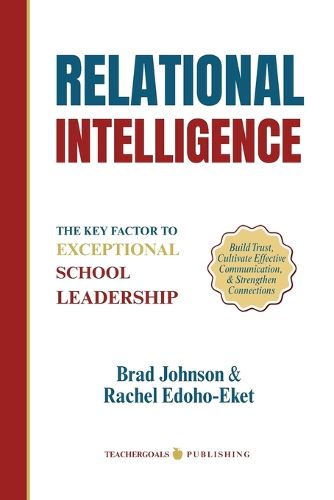Readings Newsletter
Become a Readings Member to make your shopping experience even easier.
Sign in or sign up for free!
You’re not far away from qualifying for FREE standard shipping within Australia
You’ve qualified for FREE standard shipping within Australia
The cart is loading…






This title is printed to order. This book may have been self-published. If so, we cannot guarantee the quality of the content. In the main most books will have gone through the editing process however some may not. We therefore suggest that you be aware of this before ordering this book. If in doubt check either the author or publisher’s details as we are unable to accept any returns unless they are faulty. Please contact us if you have any questions.
Relational Intelligence presents a transformative approach to school leadership, emphasizing that the strength of relationships, not just strategy or compliance, determines a leader's actual effectiveness. Drawing on decades of experience, Dr. Brad Johnson and Dr. Rachel Edoho-Eket examine how Relational Intelligence (RQ) - the ability to build trust, communicate with empathy, and connect authentically -is the defining trait of exceptional school leaders.
The book is structured around three core pillars of RQ: Trust, Communication, and Connection. These foundational elements foster a school culture where teachers feel supported, empowered, and valued, resulting in improved teacher retention, enhanced student outcomes, and increased community engagement.
Through engaging stories, actionable strategies, and research-based insights, the authors challenge the myth that leadership is about charisma or control. Instead, they advocate for vulnerability, active listening, and authenticity as vital leadership skills. Chapters explore a range of topics, including building collaborative teams, navigating crises, fostering teacher empowerment, and modeling work-life boundaries.
Leaders are encouraged to move from transactional to transformational practices, shifting from micromanagement and directives to dialogue, empowerment, and a shared vision. The authors highlight tools such as reflective feedback, strength-based leadership, and the HOPE framework (Hope, Opportunity, Praise, Encouragement) to help leaders uplift their teams and sustain positive momentum.
Ultimately, Relational Intelligence redefines what it means to lead in education, not through position or power, but by being fully present, emotionally attuned, and deeply committed to the growth of others. This book is a call to lead with heart, foster genuine human connection, and transform schools through relationships that matter.
$9.00 standard shipping within Australia
FREE standard shipping within Australia for orders over $100.00
Express & International shipping calculated at checkout
This title is printed to order. This book may have been self-published. If so, we cannot guarantee the quality of the content. In the main most books will have gone through the editing process however some may not. We therefore suggest that you be aware of this before ordering this book. If in doubt check either the author or publisher’s details as we are unable to accept any returns unless they are faulty. Please contact us if you have any questions.
Relational Intelligence presents a transformative approach to school leadership, emphasizing that the strength of relationships, not just strategy or compliance, determines a leader's actual effectiveness. Drawing on decades of experience, Dr. Brad Johnson and Dr. Rachel Edoho-Eket examine how Relational Intelligence (RQ) - the ability to build trust, communicate with empathy, and connect authentically -is the defining trait of exceptional school leaders.
The book is structured around three core pillars of RQ: Trust, Communication, and Connection. These foundational elements foster a school culture where teachers feel supported, empowered, and valued, resulting in improved teacher retention, enhanced student outcomes, and increased community engagement.
Through engaging stories, actionable strategies, and research-based insights, the authors challenge the myth that leadership is about charisma or control. Instead, they advocate for vulnerability, active listening, and authenticity as vital leadership skills. Chapters explore a range of topics, including building collaborative teams, navigating crises, fostering teacher empowerment, and modeling work-life boundaries.
Leaders are encouraged to move from transactional to transformational practices, shifting from micromanagement and directives to dialogue, empowerment, and a shared vision. The authors highlight tools such as reflective feedback, strength-based leadership, and the HOPE framework (Hope, Opportunity, Praise, Encouragement) to help leaders uplift their teams and sustain positive momentum.
Ultimately, Relational Intelligence redefines what it means to lead in education, not through position or power, but by being fully present, emotionally attuned, and deeply committed to the growth of others. This book is a call to lead with heart, foster genuine human connection, and transform schools through relationships that matter.